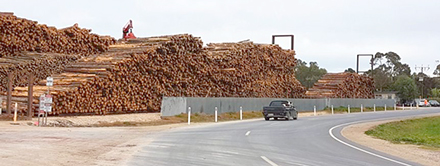A South Australian regional timber processor has warned thousands of tonnes of softwood resource are bypassing mills and heading to China, despite long-term shortages facing some businesses. Source: ABC
Softwood export volumes decreased during the start of the pandemic, but trade is again flowing through deep-sea ports in Australia.
This comes as the Federal Parliament’s Standing Committee for Agriculture and Water Resources undertakes an inquiry into the nation’s timber supply chain.
Member for Barker Tony Pasin said on ABC Radio a code of conduct could be considered for the regional industry.
Mount Gambier-based Roundwood Solutions managing director Steve Telford said softwood resource was being shipped to China despite log supply insecurity facing smaller operators.
“There are a million-plus tonnes of resource going offshore every year — that’s a massive amount of timber,” Mr Telford said.
Mr Telford, who is an industry veteran, said every time a boat left the ports, this wood was “gone for a generation”.
“We could 100 per cent use the logs going out of the Port of Portland —both pulp and sawlogs could be utilised,” he said.
Mr Telford warned emotions were running high in some sections of the industry.
“They are controlled, but they are high in their belief structures,” he said.
“There is no reason for sawlog to be leaving this country anymore. There are plenty of people in this country who would be more than happy to bid for those logs.
“I want to create 60 new jobs in the Wattle Range area at Tantanoola.”
Mr Telford said he was constantly trying to broker supply contracts with growers.
“We are hoping for a bipartisan relationship with growers, going forward, so we can be proactive in regional growth and development,” he said.
South Australian Timber Processors Association chief executive David Quill said domestic processors continued to be “embarrassed” by their inability to meet the market for their product.
“They cannot meet market demands because some forest growers are failing to supply these small family processing companies with the raw material necessary for their current and future business success,” Mr Quill said.
“The reality of the situation is that prior to the wave of export that began around 2012, these companies were able to enter into contractual arrangements with forest growers for raw material supplies sufficient to both meet market requirements and the long-term sustainability of the businesses.”
He said this was no longer the case as significant volumes of forest produce were being exported at the expense of domestic processors.
“I have no problem whatsoever with material being exported, provided that it is the material that we do not require for domestic processing — not material that we do require,” Mr Quill said.
Member for Barker Tony Pasin said more than 7000 people in Barker were employed in the forestry industry.
“The reality here it is the clear consequence of Labor’s decision to sell our forest estate,” Mr Pasin said, referring to the 2012 sale of future harvesting rights for forests in the south-east of South Australia to a foreign consortium.
“We have [South Australian Labor MP] Clare Scriven saying ‘what was the [State] Government doing about this’.”
“It is like the arsonist complaining the firefighters didn’t get there on time.”
Mr Pasin said Prime Minister Scott Morrison had asked him to join the parliamentary inquiry committee into the timber supply chain.
“We will be looking very closely at projected timber volumes over the next 30 years and investigate whether it is necessary for us to consider a code of conduct for that resource,” he said.
But he said export industry was necessary income for plantation owners during low domestic activity.
Ms Scriven, who is also the SA shadow forestry spokeswoman, urged Mr Pasin not to play politics with this issue.
She said the majority of plantation owners exported and not one company could be singled out.
“But we need to be aware there are lots of jobs in the current situation with the export industry,” Ms Scriven said.
“There are 300–350 direct jobs in the Green Triangle that are related to the export market.”
Ms Scriven said regional plantation companies needed to have a balance between domestic processing and export streams.






